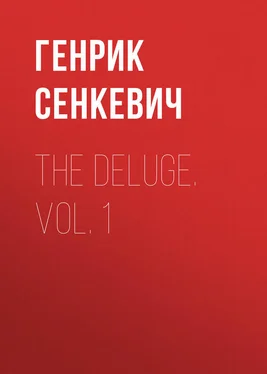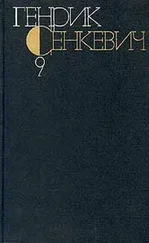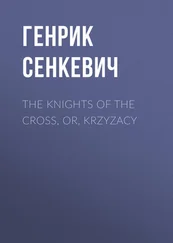Генрик Сенкевич - The Deluge. Vol. 1
Здесь есть возможность читать онлайн «Генрик Сенкевич - The Deluge. Vol. 1» — ознакомительный отрывок электронной книги совершенно бесплатно, а после прочтения отрывка купить полную версию. В некоторых случаях можно слушать аудио, скачать через торрент в формате fb2 и присутствует краткое содержание. Жанр: foreign_antique, foreign_prose, на английском языке. Описание произведения, (предисловие) а так же отзывы посетителей доступны на портале библиотеки ЛибКат.
- Название:The Deluge. Vol. 1
- Автор:
- Жанр:
- Год:неизвестен
- ISBN:нет данных
- Рейтинг книги:4 / 5. Голосов: 1
-
Избранное:Добавить в избранное
- Отзывы:
-
Ваша оценка:
- 80
- 1
- 2
- 3
- 4
- 5
The Deluge. Vol. 1: краткое содержание, описание и аннотация
Предлагаем к чтению аннотацию, описание, краткое содержание или предисловие (зависит от того, что написал сам автор книги «The Deluge. Vol. 1»). Если вы не нашли необходимую информацию о книге — напишите в комментариях, мы постараемся отыскать её.
The Deluge. Vol. 1 — читать онлайн ознакомительный отрывок
Ниже представлен текст книги, разбитый по страницам. Система сохранения места последней прочитанной страницы, позволяет с удобством читать онлайн бесплатно книгу «The Deluge. Vol. 1», без необходимости каждый раз заново искать на чём Вы остановились. Поставьте закладку, и сможете в любой момент перейти на страницу, на которой закончили чтение.
Интервал:
Закладка:
This union, brought about through the marriage of the Polish princess Yadviga to Yagyello, Grand Prince of Lithuania, and by exceedingly adroit management on the part of the Polish nobles and clergy, opened to the Poles immense regions of country and the way to vast wealth. Before the union their whole land was composed of Great and Little Poland, with Mazovia (see map); after the union two thirds of the best lands of pre-Tartar Russia formed part of the Commonwealth.
Since Poland managed to place and maintain itself at the head of affairs, though this roused at all times opposition of varying violence in the other two parts of the Commonwealth, the social ideals and political structure of Poland prevailed in Lithuania and Russia, so far as the upper classes were concerned. In Lithuania, by the terms of the union, all were obliged to become Catholic; in different parts of Russia, which was Orthodox, the people were undisturbed in their religion at first; but after a time the majority of the nobles became Catholic in religion, and Poles in language, name, manners, and ideas. To these was added a large immigration of Polish nobles seeking advancement and wealth. All Russia found itself after a time under control of an upper class which was out of all sympathy with the great mass and majority of the people.
During the Yagyellon dynasty, which lasted from 1386 to 1572, the religious question was not so prominent for any save nobles; but ownership of their own land and their own labor was gradually slipping away from the people. During the reign of Sigismund III. (1587-1632), religion was pushed to the foreground, the United Church was brought into Russia; and land and religion, which raise the two greatest problems in a State, the material and the spiritual, were the main objects of thought throughout Russia.
Under Vladislav in 1648 the storm burst forth in Southern Russia. There was a popular uprising, the most wide-spread and stubborn in history, during which the Poles lost many battles and gained one great victory, that of Berestechko; the Southern Russians turned to the North, and selected the Tsar Alexai Mihailovich as sovereign.
Jan. 8, 1654, there was a great meeting in Pereyaslav, 2 2 Pereyaslav will be remembered by the readers of FIRE AND SWORD as the place where the Polish commissioners with Adam Kisel brought the baton and banner from the king to Hmelnitski.
at which Bogdan Hmelnitski, hetman of the Zaporojian army and head of all Southern Russia, after he had consulted with the Cossacks, took his place in the centre of the circle, and in presence of the army, the people, and Buturlin, the envoy of Alexai Mihailovich, said: -
"Gentlemen, Colonels, Essauls, Commanders of hundreds, the whole Zaporojian army, and all Orthodox Christians, – You know how the Lord delivered us from the hands of our enemies who persecuted the Church of God and were envenomed against all Christians of our Eastern Orthodoxy. We have lived six years without a sovereign, in endless battles against our persecutors and enemies who desire to root out the church of God, so that the Russian name may not be heard in our land. This position has grown unendurable, and we cannot live longer without a sovereign. Therefore we have assembled a council before the whole people, so that you with us may choose from four sovereigns that one whom you wish. The first is the Sovereign of Turkey, who has invited us under his authority many times through his envoys; the second is the Khan of the Crimea; the third the King of Poland, who, if we wish, may receive us into former favor; the fourth is the Orthodox sovereign, the Tsar and Grand Prince Alexai Mihailovich, the sole ruler of all Russia, whom we have been imploring six years with unceasing petitions. Choose whom you like. The Sovereign of Turkey is a Mussulman; you all know how our brethren, the Greeks, Orthodox Christians, suffer, and what persecution they endure from godless men. A Mussulman also is the Khan of the Crimea, whom we took into friendship of necessity, by reason of the unendurable woes which we passed through. Of persecutions from Polish lords it is needless to speak; you know yourselves that they esteemed a Jew and a dog more than a Christian, our brother. But the great Orthodox sovereign of the East is of one faith with us, one confession of the Greek rite; we are one spiritual body with the Orthodoxy of Great Russia, having Jesus Christ for our head. This great sovereign, this Christian Tsar, taking pity on the suffering of our Orthodox church in Little Russia, giving ear to our six years' entreating, has inclined his heart to us graciously, and was pleased to send with his favor dignitaries from near his person. If we love him earnestly, we shall not find a better refuge than his lofty hand. If any man is not agreed with us, let him go whither he pleases; the road is free-"
Here the whole people shouted: "We choose to be under the Orthodox sovereign; better to die in our Orthodox faith than to go to a hater of Christ, to a Pagan!"
Then the Pereyaslav colonel, Teterya, passed around in the circle, and asked in every direction: "Are all thus agreed?"
"All with one spirit," was the answer.
The hetman now said: "May the Lord our God strengthen us under the strong hand of the Tsar."
The people shouted back in one voice: "God confirm us! God give us strength to be one for the ages!"
The hetman, the army, and the representatives of Southern Russia took the oath of allegiance to the Tsar. The result of this action was a war between the Commonwealth on one side, and Northern and Southern Russia on the other. The Commonwealth being thus occupied on the east, Sweden decided to attack on the west.
The war between Russia and the Commonwealth lasted thirteen years, and ended with a truce of thirteen years more, made at Andrusovo. By this agreement the city and province of Smolensk went to Russia, and all the left bank of the Dnieper, while Kieff was to be occupied by Poland after two years. This truce became a treaty during the reign of Sobyeski. Kieff remained with the Russians, and peace was unbroken till the second half of the following century, when all Russia west of the Dnieper was restored to the East in nearly the same limits which it had before the Tartar invasion; excepting the territory included in Galicia, and known as Red Russia.
Jeremiah Curtin.Smithsonian Institution, Bureau of Ethnology,
November 25, 1891.
REMARKS ON PERSONAGES IN "THE DELUGE."
Yan Kazimir was a son of Sigismund III., who was a son of King John of Sweden and Catherine, daughter of Sigismund I. of Poland.
John of Sweden was succeeded by his son Sigismund, who under the name of Sigismund III. was elected King of Poland in 1587 to succeed his mother's brother, Sigismund Augustus, the last descendant of Yagyello in the male line.
Sigismund III. was dethroned by the Swedes, and his issue excluded from the succession. Duke Charles, the ablest of Gustavus Vasa's sons, and uncle of Sigismund, was made king as Charles IX.
This Charles IX. was father of Gustavus Adolphus. Gustavus Adolphus was succeeded by his only daughter, Christina, who would not marry, and who after reigning for a time resigned in favor of her cousin Karl Gustav of Zweibrücken, 3 3 "Two-bridges." the Bipont of page 523, Vol. II.
son of the only sister of Gustavus Adolphus. Gustavus Vasa was therefore the great-grandfather of both Yan Kazimir and Karl Gustav, who were thus second cousins. The Polish Vasas laid claim to the Swedish crown, thereby causing the Commonwealth during sixty years much loss in money and men. Yan Kazimir relinquished this claim when he made peace with Sweden.
Before his election Yan Kazimir, being a cardinal, was dispensed from his vows by the Pope. Chosen king, he married Louise Marie, daughter of the Duke of Nevers, a woman of strong will and much beauty.
Читать дальшеИнтервал:
Закладка:
Похожие книги на «The Deluge. Vol. 1»
Представляем Вашему вниманию похожие книги на «The Deluge. Vol. 1» списком для выбора. Мы отобрали схожую по названию и смыслу литературу в надежде предоставить читателям больше вариантов отыскать новые, интересные, ещё непрочитанные произведения.
Обсуждение, отзывы о книге «The Deluge. Vol. 1» и просто собственные мнения читателей. Оставьте ваши комментарии, напишите, что Вы думаете о произведении, его смысле или главных героях. Укажите что конкретно понравилось, а что нет, и почему Вы так считаете.











